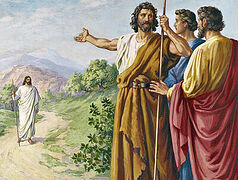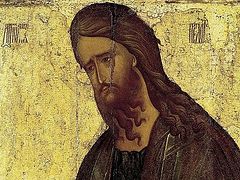 People who are foreordained by Providence for great works in the kingdom of grace are conceived and born under God’s special care. God has often chosen weak nature as an instrument for the birth of His chosen ones, thereby instructing us that for the fulfillment of His great and holy predestinations, needed is not the strength of nature but the strength of God, made perfect in weakness. This came true in the Conception of the Forerunner by Elisabeth, who according to the voice of the Church, is “she who before was barren, who had not given birth, has conceived the lamp who would illumine the whole world, afflicted with blindness.”
People who are foreordained by Providence for great works in the kingdom of grace are conceived and born under God’s special care. God has often chosen weak nature as an instrument for the birth of His chosen ones, thereby instructing us that for the fulfillment of His great and holy predestinations, needed is not the strength of nature but the strength of God, made perfect in weakness. This came true in the Conception of the Forerunner by Elisabeth, who according to the voice of the Church, is “she who before was barren, who had not given birth, has conceived the lamp who would illumine the whole world, afflicted with blindness.”
During the time of Herod King of Judea, there was a certain Zacharias, a priest of the division of Abijah, and his wife Elisabeth was of the lineage of Aaron. Both were righteous before God, acting in all things according to the Lord’s commandments and laws. They had no children, for Elisabeth was barren, and both were advanced in years. One day Zacharias was serving in his turn before God. There were many people in the temple for prayer. As Zacharias was censing, an Angel of the Lord appeared, standing on the right side of the censing altar. When he saw the Angel, Zacharias was troubled, and fear fell upon him. For thy prayer is heard; and thy wife Elisabeth shall bear thee a son, and thou shalt call his name John. And thou shalt have joy and gladness; and many shall rejoice at his birth. For he shall be great in the sight of the Lord, and shall drink neither wine nor strong drink; and he shall be filled with the Holy Ghost, even from his mother's womb. And many of the children of Israel shall he turn to the Lord their God. And he shall go before him in the spirit and power of Elias, to turn the hearts of the fathers to the children, and the disobedient to the wisdom of the just; to make ready a people prepared for the Lord. Whereby shall I know this? said Zacharias, for I am an old man, and my wife well stricken in years. And the angel answering said unto him, I am Gabriel, that stand in the presence of God; and am sent to speak unto thee, and to shew thee these glad tidings. And, behold, thou shalt be dumb, and not able to speak, until the day that these things shall be performed, because thou believest not my words, which shall be fulfilled in their season. Meanwhile the people were waiting for Zacharias and wondered why he was tarrying in the holy place. When he emerged, Zacharias was already unable to speak, and those standing in the temple understood that he had seen a vision. When his day of service ended, Zacharias returned to his house. Elizabeth his wife conceived and gave thanks to the Lord that He had looked upon her to take away her reproach among people (Lk. 1:5–25). Thus, the conception of the Forerunner was miraculous and glorious, according to the special care and promise of God! In the sixth month after his conception, the Forerunner confessed the Lord by his joyful leaping in his mother’s womb when she met the Mother of God.
In remembrance of the conception of the Forerunner according to God’s special purpose, the Orthodox Church keeps a feast that without a doubt was established during the early years of Christianity. For the Orthodox Church immutably acts according to the words of the Gospel, and the Gospel depicts the conception of the Forerunner as a lofty and joyful event, inspiring us to thank God for this event and to celebrate it. Truly, the appointment itself of the day of the conception of the Baptist, which has come down to our day, goes back to the ancient times of Christianity. From the fourth century we have the discourses of St. John Chrysostom that he gave on the day of the Conception of the Forerunner at the divine service. In the eighth century by St. John Damascene, and in ninth century Byzantium, many church hymns were written for the day of the Conception of the Forerunner, sung even now at the services.
In glorifying the Conception of the Forerunner, by the special purpose of God, the Church also glorifies in its hymns his righteous parents. “The barren one who had not borne children, rejoices now greatly, for she has conceived the radiant lamp of the Sun, who will truly enlighten the entire world. Rejoice, O Zacharias, and cry out with boldness: ‘The prophet of the Most High now desires to be born.’ The great Zacharias radiantly rejoices, together with his all-glorious wife, Elizabeth, who worthily conceives John the Forerunner, whom the Archangel joyfully announced. And let us, ye people, meetly honor him, for he is an initiate of grace.”
Source: Lives of the Saints, Venerated by the Orthodox Church, with Information on the Feasts of the Lord and the Theotokos, and on the Miraculous Icons, Compiled by His Grace Philaret (Gumilevsky), Archbishop of Chernigov.



